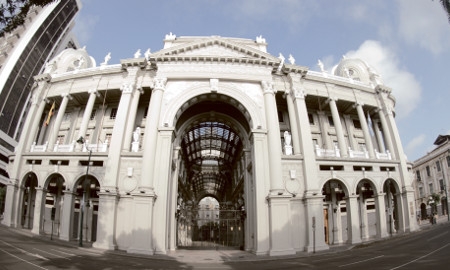Guayaquil has throughout history proven to be an open city. Its port and commerce have been key in molding its personality as a hospitable place full of canny negotiators; two key qualities required for a healthy atmosphere that enables business to flourish. Currently the city is also becoming an important tourist destination.
The recent urban regeneration plans for Guayaquil led by the local authorities have radically changed the face of the city, reinforcing it as a tourist and business destination and creating added economic activity through residential and environmental real estate projects that are turning the city into a strategic business center. Perhaps the most significant symbol of the new Guayaquil is the Malecón 2000, or to give it its original name the Malecón Simón Bolívar project. This urban regeneration, of some 2.5km, takes visitors on a guided tour through the main monuments and areas of interest in the city. A trip through the city’s past with a look to the future.
“Guayaquil is growing in so many ways, and there is a real public and private synergy here; we are growing in tourism, construction, social housing, hospitality, and in shopping centers, not to mention what commerce, industry, trade and exports the city is generating,” says Mayor Jaime Nebot Saadi.
| The economy of the Guayas province, of which Guayaquil is the capital, makes up 25% of the national GDP |
Guayaquil and the outlying region has been a commercial and trade center since colonial days. It housed the Royal Shipyard of the Spanish Crown due to the close proximity of forests thick with lignum vitae, mangrove, balsa and laurel woods. Since then it has become a city that strives to innovate to maintain its role as a leader.
“Guayaquil’s people are known for their open personalities and to being used to foreign traders. This helps attract international investors to new business models and creates growth in traditional sectors that are always open to new competitors,” says Rafael Suárez, Managing Director of Mapfre Atlas, part of the Spanish Mapfre Group and the second biggest insurance company in Latin America.
According to figures provided by the Central Bank of Ecuador, the economy of the Guayas province, where Guayaquil is the capital, made up more than a quarter of Ecuador’s GDP in 2010. The city accounts for around 30% of all taxation collected and is home to the highest number of large domestic and international companies in the country, including 24 of the 50 biggest private Ecuadorian companies not involved in the petroleum sector. The agricultural, fishing, manufacturing and construction sectors are the main benefactors of this investment.
The city boasts two specific motors of commerce: the first, the port, is the most important in the country and one of the busiest on the Pacific coast. Through it passes 73% of the country’s imports, 47% of its exports and 80% of all Ecuadorian freight. The other motor is small and medium-sized businesses, characterized by the entrepreneurial spirit of their owners. The almost 90,000 small businesses listed in the Guayaquil district make up an important part of the local economy and can been seen when walking down any street and boulevard. They generated growth and incomes valued at $35.5 billion in 2010, equivalent to 60% of the GDP and providing work for 441,976 people – approximately 7% of the country’s working population, according to statistics provided by the National Institute of Statistics and Census (INEC). One of those is José, a traveling salesman who says he started trading as soon as he came to the city in March 1998. “From what I sell we have enough for food at home. What we sell to local shops and bars gives us enough to pay for the studies of my two beautiful ‘guayaquileña’ daughters and all our basic needs,” he says.
Ernesto Murrieta Jordán, an expert in small and medium-sized enterprises, believes the city is a great place for small businesses to thrive due to the continual demand for all types of products. “The city is continuously moving at an exceptional speed, so much so that people who can’t find direct work have the opportunity to take part in all manner of economic activities, through the sale of products or domestic services,” he says. In addition the economic activity of these companies creates a demand for goods and products of other companies in the region and also creates a demand for energy: revenues generated by the Guayaquil Electric Company make up almost 28% of the total generated nationally.

3 COMMENTS
We were in Guayaquil, and our group was very impressed not only for the beauty of this tropical paradise but also for the great tourism develpment on the area, so many hotels to choose from, restaurants, nice airport and a hub to the Galapagos Islands, make this place a warm welcome place for tourist and bussiness, Congratulations Ecuador taking giant steps to the right direction.
I must say that I am a great fan of Galapagos, and always take the route vía Guayaquil. Amongst other things I make sure to enjoy their unique & famous red crab!
China and Ecuador have a lot to benefit from a good collaboration. Nice country, nice people.